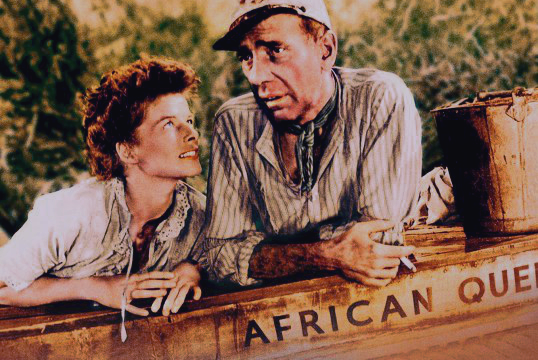Title/Year; African Queen/1951
Director/Birth Country/Year Born; John Huston/U.S./1906
Budget; 1.3 million
Gross; 4.3 million
Synopsis; Humphrey Bogart plays Charlie Allnut, captain of a small cargo ship named the African Queen that delivers mail and supplies to villages and christian missionaries along the river in then unoccupied but German controlled east Africa in 1914 during the onset of WW1. Allnut informers Miss Rose Sayer, played by Katharine Hepburn that the Germans are eradicating the populace. On a return trip a few days later, Allut finds the village destroyed and Miss Sayer burying her dead brother. They set down the river back to civilization together and Miss Sayer is rather perturbed by the drunken, filthy lifestyle lived by riverboat captain Allnut. Allnut attempts to become a gentleman and eventually Miss Sayer is charmed by Bogart’s performance. She convinces him to turn his small steamboat into a warship by constructing rudimentary torpedoes and mounting them of the bow of the Queen so they can attempt to engage a large German warship in battle that protects the lake. Allnut begrudgingly agrees and they make their way past crocodile and leech infested waters, treacherous rapids, and a near call with a German military outpost while developing romantic reliance upon each other. At the mouth of the river, the boat gets lost in the delta and the couple nearly dies from fever and dehydration. A flash rainstorm creates a swell of water and it pushes them into the large lake. The Queen is rolled over on the attack run, Sayer and Allnut are picked up by the Germans. During the questioning the German gunship accidentally runs into the wrecked African Queen, the torpedoes blow a hole in the ship, And the river weary couple rejoice having done their godly duty.
Narrative and Visual Keywords; Charming, Proper, Christian, Rugged.
Characterization/ Dialogue; Bogart plays a drunk Englishman, while Hepburn plays a very (christian) proper lady of the time. The dialogue is very simple, but effective.
Camera/lighting/editing technique; Technicolor. Flat visuals. Digestible.
Political/ Social Commentary; Portrayal of Germans as warrish brutes.
Historical Relevance/ Recognition; The ships and technology were researched and portrayed correctly.
Notable Collaboration; Bogart and Huston.
Random fact, Etc; The script had to be re-written for Bogart as he was incapable of producing a cockney accent well enough.
1. Did you find any evidence of ineffective military leadership (associated with upper-class ineptitude) that is compensated for through hard work and commitment of the lowly infantryman? Any scene where difference in social class is evident? Describe the dynamic or scene in which this theme is portrayed.
~In the final scene where Bogart and Hepburn are captured by the Germans, the commander is loud and garish. There is a lack of military respect present on the German gunship.
2. Does the film show a
suffering soldier as a victim of war rather than exposing the structure
of
violence and presenting soldiers as elements in it? Or does it portray
the soldier as a strong individual following codes of honor and duty How
does the film achieve
this point of view?
~The film only has passing shots of soldiers running around doing the commands barked at them by their superiors. They are just peons at the whim of the officers.
3. Does the film offer the
audience the familiar pleasures of cinema – the romantic scenarios and
melodramatic poses woven into a more direct and immediate sense of war? What elements of spectacle in the story (battle scenes or otherwise) achieve a sense of melodrama?
~This film is primarily a romantic Hollywood story featuring a man and woman falling in love while battling adversities. They are dealing with elements of the war being an antagonistic force, but it is an equal battle to fight their way through the wilderness. The climactic ending of the film sends the message that love conquers all, war be dammed.
4. Is the enemy
portrayed as neutral or through hysterical exaggerations of atrocity?
~The Germans are just "the enemy" but it is never elaborated why. this makes them very neutral.

No comments:
Post a Comment